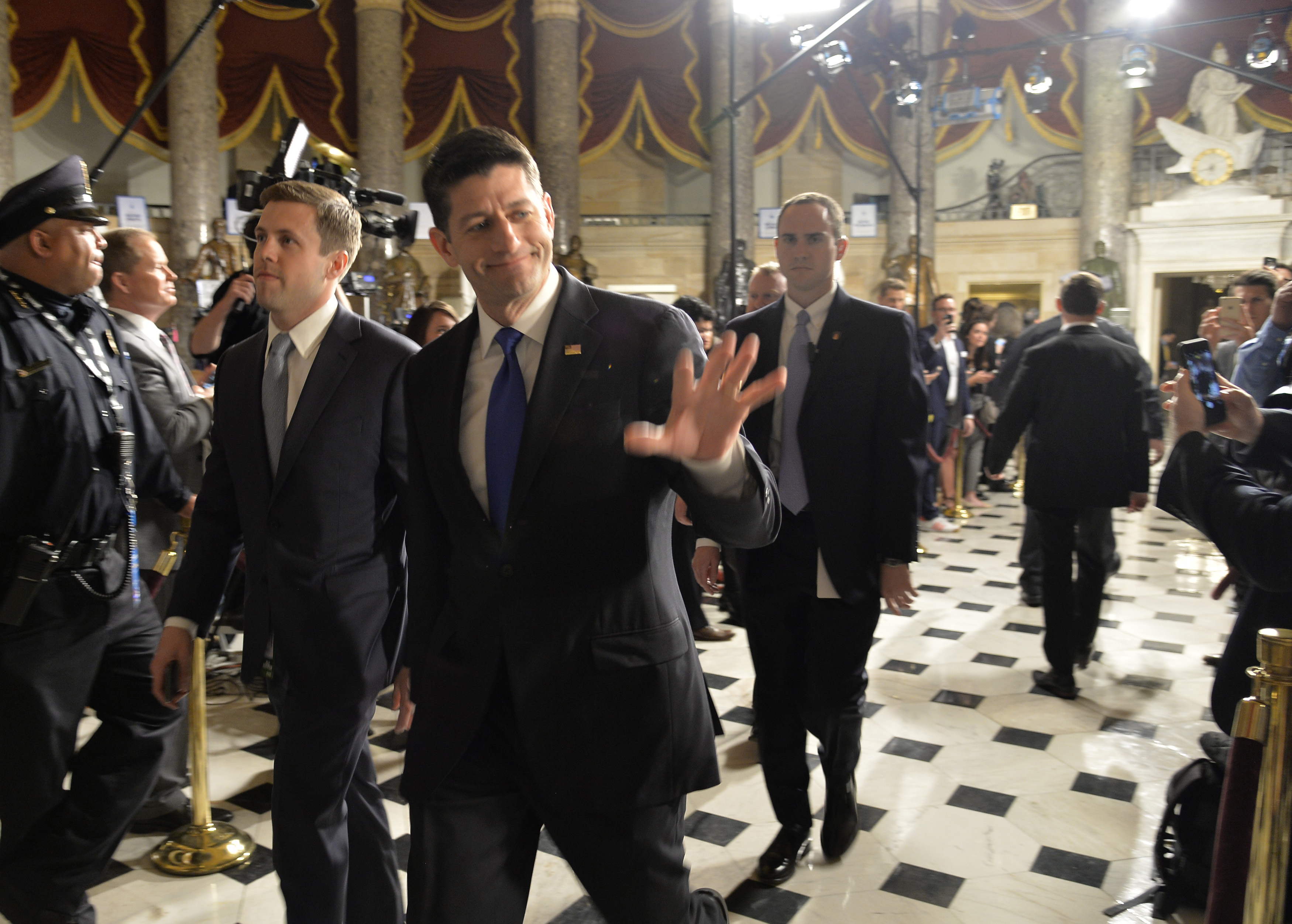Can Republicans avoid the dreaded health-care death spiral?
Maybe — but they'll have to freeze out the old, sick, and poor


Ever since ObamaCare passed, the "death spiral" has hung over debates about health reform like some wonk prophecy of doom.
A death spiral occurs when a health insurer's pool of paying customers contains too many sick people. That drives up the insurer's costs, which then drives up customers' premiums, which then drives away customers. And since healthy customers are the ones most likely to risk going without insurance, the sick customers increase as a portion of the insurer's pool. And so the deadly cycle continues, until the insurer collapses.
ObamaCare tried to prevent death spirals by requiring insurers to offer everyone coverage no matter how sick they are, while simultaneously requiring everyone to buy coverage. The first part of that — the ban on denying coverage based on pre-existing conditions — saddled insurers with more sick customers. But the second part — ObamaCare's individual mandate — gave insurers more healthy customers to balance things out. The two rules require one another.
The Week
Escape your echo chamber. Get the facts behind the news, plus analysis from multiple perspectives.

Sign up for The Week's Free Newsletters
From our morning news briefing to a weekly Good News Newsletter, get the best of The Week delivered directly to your inbox.
From our morning news briefing to a weekly Good News Newsletter, get the best of The Week delivered directly to your inbox.
The individual mandate, however, is arguably the most hated part of ObamaCare. And Republicans are really eager to get rid of it.
On Monday, the GOP released their ObamaCare replacement plan, the American Health Care Act (AHCA). Sure enough, the individual mandate's tax penalty is toast, while the rule against denying coverage because of pre-existing conditions remains in effect. So how is the AHCA going to avoid causing a death spiral?
Well, it may not. But it's going to try, using several different provisions.
The first is what's called the "continuous coverage" requirement. Americans will no longer pay a tax penalty simply for not having health insurance. But if they go more than 63 days without coverage of some sort, and then try to buy a new plan, the insurer can charge them a 30 percent additional fee on top of their premium for a full year. The idea is to incentivize people to stay covered, and not skip out when they're healthy and then buy back in when they're sick.
A free daily email with the biggest news stories of the day – and the best features from TheWeek.com
There are a few problems here. For one thing, people can easily lose their coverage through no fault of their own — for instance, if they're covered through their employer and then suddenly lose their job. On top of that, poor and working-class Americans are much more likely to lose their jobs in an economic downturn, and they'll have the toughest time buying their own plan in the 63-day window.
This brings us to the next provision, which is the refundable tax credits the AHCA offers to help people pay their premiums.
ObamaCare has a similar provision, but its subsidies phase out pretty quickly as households rise up the income ladder. This caused plenty of problems, since a lot of healthy middle-class Americans — who the system needs to buy insurance to keep ObamaCare's insurance markets stabilized — are simply going without coverage because premiums are unaffordable and their subsidies are skimpy. At the same time, ObamaCare's tax credits are actually very generous to poorer households and older insurance customers.
The AHCA has the opposite problem. Its tax credits give much more help to healthy middle-class people than ObamaCare does. But the AHCA's tax credits are also relatively stingy and the same flat rate for everyone — they're only adjusted slightly for age. That leaves poorer and older Americans in the lurch.
ObamaCare also requires that the premiums insurers charge old people could be at most three time as big as premiums for young people. The GOP wants to scrap that rule entirely. This would probably encourage young people (who tend to be healthier) to sign up. But it would also make coverage far more expensive for older people, who badly need the care. Vox's Sarah Kliff reported that "this particular policy would lower premiums for a 24-year-old from $2,800 to $2,100. But premiums for a 64-year-old would rise from $8,500 to $10,600."
Lastly, the AHCA includes funding for something called high-risk pools. These are separate insurance markets specifically for sick people with pre-existing conditions. ObamaCare had put those customers into the same insurance market as healthy people, while high-risk pools quarantine the sick people in their own market. High-risk pools avoid raising premiums for healthy people, but they also require really big subsidies to help sick people buy coverage. And the funding the Republicans propose in the AHCA isn't anywhere near enough to fund the high-risk pools properly.
Let's not forget the basic purpose of ObamaCare: Lots of Americans who badly needed health care either couldn't afford coverage or were actively denied coverage. ObamaCare is not perfect, but it made progress in solving both those problems. The Republican plan, meanwhile, opens up a bunch of new cracks in the health system through which poorer, sicker, and older Americans can be quietly pushed out of the health insurance markets.
That's how the GOP plan is trying to avoid a death spiral — by creating new versions of the problems that ObamaCare tried to solve.
Jeff Spross was the economics and business correspondent at TheWeek.com. He was previously a reporter at ThinkProgress.
-
 Crossword: December 30, 2025
Crossword: December 30, 2025The daily crossword from The Week
-
 What have Trump’s Mar-a-Lago summits achieved?
What have Trump’s Mar-a-Lago summits achieved?Today’s big question Zelenskyy and Netanyahu meet the president in his Palm Beach ‘Winter White House’
-
 The most anticipated movies of 2026
The most anticipated movies of 2026The Week Recommends If the trailers are anything to go by, film buffs are in for a treat
-
 Bari Weiss’ ‘60 Minutes’ scandal is about more than one report
Bari Weiss’ ‘60 Minutes’ scandal is about more than one reportIN THE SPOTLIGHT By blocking an approved segment on a controversial prison holding US deportees in El Salvador, the editor-in-chief of CBS News has become the main story
-
 Has Zohran Mamdani shown the Democrats how to win again?
Has Zohran Mamdani shown the Democrats how to win again?Today’s Big Question New York City mayoral election touted as victory for left-wing populists but moderate centrist wins elsewhere present more complex path for Democratic Party
-
 Millions turn out for anti-Trump ‘No Kings’ rallies
Millions turn out for anti-Trump ‘No Kings’ ralliesSpeed Read An estimated 7 million people participated, 2 million more than at the first ‘No Kings’ protest in June
-
 Ghislaine Maxwell: angling for a Trump pardon
Ghislaine Maxwell: angling for a Trump pardonTalking Point Convicted sex trafficker's testimony could shed new light on president's links to Jeffrey Epstein
-
 The last words and final moments of 40 presidents
The last words and final moments of 40 presidentsThe Explainer Some are eloquent quotes worthy of the holders of the highest office in the nation, and others... aren't
-
 The JFK files: the truth at last?
The JFK files: the truth at last?In The Spotlight More than 64,000 previously classified documents relating the 1963 assassination of John F. Kennedy have been released by the Trump administration
-
 'Seriously, not literally': how should the world take Donald Trump?
'Seriously, not literally': how should the world take Donald Trump?Today's big question White House rhetoric and reality look likely to become increasingly blurred
-
 Will Trump's 'madman' strategy pay off?
Will Trump's 'madman' strategy pay off?Today's Big Question Incoming US president likes to seem unpredictable but, this time round, world leaders could be wise to his playbook
